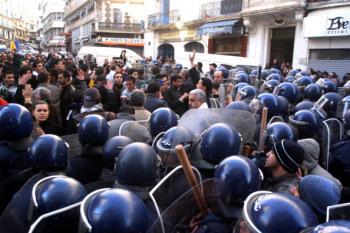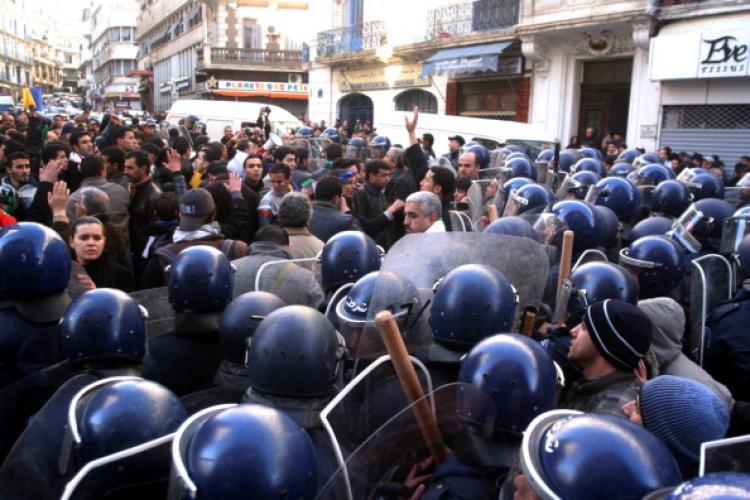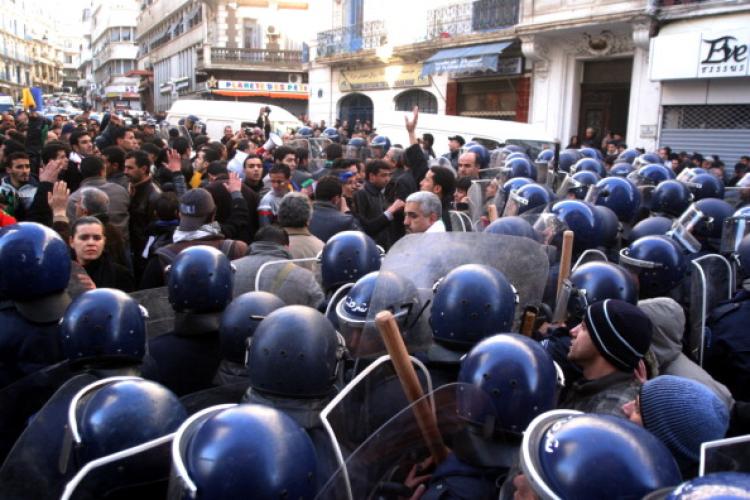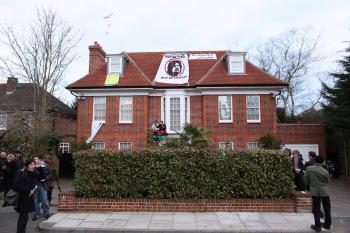With protests flaring up across North Africa and the Middle East—Tunisia, Egypt, Yemen, Iran, Algeria—one assumption common in the West is that these nations’ citizens are inspired by Western freedom, and stimulated through social media, to call for the overthrow of their old, restrictive regimes, to replace them with … Western style democracies.
However, this may not be the case. Western democracy is not necessarily the highest aspiration of the protest movements.
The common thread is that people are trying to seize upon the momentum building across the region to demand improvements. The last months and weeks have been challenging for leaders in North Africa and the Middle East.
Starting in Tunisia where popular pressure drove President Zine El Abidine Ben Ali out of the country a month ago, Egypt’s President Hosni Mubarak followed last Friday. Yemen, Algeria, Jordan, and Iran have also had to deal with protests obviously inspired by the success of Tunisia’s successful Jasmine revolution. Syrian opposition tried to hold demonstrations but have not been successful.
But while they wish improvement, even the nature of what that means has not been consistent across the countries, or among all individuals. And certainly it is not true, say some observers, that their wish is democracy.
”It is fair to say that most protesters equate the ability to get rid of a hated leader … and to choose their leaders in free and fair elections, with democracy,” says Sylvia Maier, assistant professor at New York University School of Continuing and Professional Studies Center for Global Affairs.
However, the democratic model that we know in the West is broader than that and not necessarily pursued everywhere. Maier says a portion of the protesters in Tunisia, Egypt, and Yemen want to get rid of “an entire political order, characterized by arbitrary rule, the absence of the rule of law, little freedom of speech, endemic corruption, inefficiency, and a thoroughly unjust social and economic order,” and install the protection of more equal rights.
Tunisia, one month into its transition is starting to realize that reforming a society into a democracy is “a long haul business,” professor Rym Kaki of the University of Southern California wrote in an e-mail.
“Look at Tunisia’s revolution as a tornado. It leaves a great deal of damage for years to fix and clean up.”
Some Tunisians might not have realized this looking at the number of Tunisians now attempting to flee to Italy. “We cannot speculate much about the reason why they fled other than an act of desperation,” she wrote.
Next: President Hosni Mubarak’s resignation was exuberantly celebrated
Looking at Egypt, President Hosni Mubarak’s resignation was exuberantly celebrated, but then soon followed by new protests for wage increases. An economic change could prove more important for Egyptians than a democratic change. “They are tired of a weak economy that sustains poverty, not prosperity,” wrote Kim Holmes, vice president of the Heritage Foundation, on the think tank’s blog.
Holmes believes this economic drive is stronger than the wish for Western-style liberal democracy. Egyptians want democracy, but they also support some Islamist policies, she wrote, quoting a PEW poll from last year.
An analysis by George Friedman for geopolitical intelligence company Stratfor, asserts that the Egyptians are quite satisfied with the current regime consisting of “complex institutions centered on the military, but also including the civilian bureaucracy controlled by the military.” In the article published Monday, Friedman argues, “The demonstrators never called for the downfall of the regime. They demanded that Mubarak step aside.“
In his estimation, although the military as a rule does not like mob gatherings, it welcomed the political crisis the demonstrations created to allow the military to step in and “save the regime and preserve its own interests.”
Now that the military supreme council has promised reforms and elections people seem to be satisfied.
Since Mubarak’s departure last Friday, observers are turning their attention to Yemen. The case of Yemen is more complicated. Besides having a hated leader, Yemen suffers from “an increasingly violent secessionist movement in the south, the seven-year Houthi rebellion in northern Sa’ada, and significant activity by a resurgent al-Qaeda,” wrote Christopher Boucek of the Carnegie Endowment in an analysis.
Shaken by Ben Ali’s flight from Tunisia, the Yemeni regime of Ali Abdullah Saleh offered several economic and political concessions to hopefully placate the populace. National income tax was cut by half, salaries of civil servants were increased, and Saleh promised that neither he nor his son would run for president in 2013. However, like in Egypt, for some protesters concessions are not enough—they want Saleh to join the ranks of Ben Ali and Mubarak.
In Jordan, Syria, and Algeria, protesters do not appear to be agitating for fundamental structural change in order to be satisfied. According to Maier, Jordanians would be happy with a “new prime minister (done), a reduction in corruption, and a bit more breathing room for civil society.”
More breathing room would also be acceptable to Syria, according to Maier, where a “substantial reduction in the worst excesses of the police state” is what’s desired.
And in Algeria, the regime already promised this week to accommodate the greatest wish of its people: to be free from the shackles of two decades under a state of emergency.
However, this may not be the case. Western democracy is not necessarily the highest aspiration of the protest movements.
The common thread is that people are trying to seize upon the momentum building across the region to demand improvements. The last months and weeks have been challenging for leaders in North Africa and the Middle East.
Starting in Tunisia where popular pressure drove President Zine El Abidine Ben Ali out of the country a month ago, Egypt’s President Hosni Mubarak followed last Friday. Yemen, Algeria, Jordan, and Iran have also had to deal with protests obviously inspired by the success of Tunisia’s successful Jasmine revolution. Syrian opposition tried to hold demonstrations but have not been successful.
But while they wish improvement, even the nature of what that means has not been consistent across the countries, or among all individuals. And certainly it is not true, say some observers, that their wish is democracy.
”It is fair to say that most protesters equate the ability to get rid of a hated leader … and to choose their leaders in free and fair elections, with democracy,” says Sylvia Maier, assistant professor at New York University School of Continuing and Professional Studies Center for Global Affairs.
However, the democratic model that we know in the West is broader than that and not necessarily pursued everywhere. Maier says a portion of the protesters in Tunisia, Egypt, and Yemen want to get rid of “an entire political order, characterized by arbitrary rule, the absence of the rule of law, little freedom of speech, endemic corruption, inefficiency, and a thoroughly unjust social and economic order,” and install the protection of more equal rights.
Tunisia, one month into its transition is starting to realize that reforming a society into a democracy is “a long haul business,” professor Rym Kaki of the University of Southern California wrote in an e-mail.
“Look at Tunisia’s revolution as a tornado. It leaves a great deal of damage for years to fix and clean up.”
Some Tunisians might not have realized this looking at the number of Tunisians now attempting to flee to Italy. “We cannot speculate much about the reason why they fled other than an act of desperation,” she wrote.
Next: President Hosni Mubarak’s resignation was exuberantly celebrated
Looking at Egypt, President Hosni Mubarak’s resignation was exuberantly celebrated, but then soon followed by new protests for wage increases. An economic change could prove more important for Egyptians than a democratic change. “They are tired of a weak economy that sustains poverty, not prosperity,” wrote Kim Holmes, vice president of the Heritage Foundation, on the think tank’s blog.
Holmes believes this economic drive is stronger than the wish for Western-style liberal democracy. Egyptians want democracy, but they also support some Islamist policies, she wrote, quoting a PEW poll from last year.
An analysis by George Friedman for geopolitical intelligence company Stratfor, asserts that the Egyptians are quite satisfied with the current regime consisting of “complex institutions centered on the military, but also including the civilian bureaucracy controlled by the military.” In the article published Monday, Friedman argues, “The demonstrators never called for the downfall of the regime. They demanded that Mubarak step aside.“
In his estimation, although the military as a rule does not like mob gatherings, it welcomed the political crisis the demonstrations created to allow the military to step in and “save the regime and preserve its own interests.”
Now that the military supreme council has promised reforms and elections people seem to be satisfied.
Since Mubarak’s departure last Friday, observers are turning their attention to Yemen. The case of Yemen is more complicated. Besides having a hated leader, Yemen suffers from “an increasingly violent secessionist movement in the south, the seven-year Houthi rebellion in northern Sa’ada, and significant activity by a resurgent al-Qaeda,” wrote Christopher Boucek of the Carnegie Endowment in an analysis.
Shaken by Ben Ali’s flight from Tunisia, the Yemeni regime of Ali Abdullah Saleh offered several economic and political concessions to hopefully placate the populace. National income tax was cut by half, salaries of civil servants were increased, and Saleh promised that neither he nor his son would run for president in 2013. However, like in Egypt, for some protesters concessions are not enough—they want Saleh to join the ranks of Ben Ali and Mubarak.
In Jordan, Syria, and Algeria, protesters do not appear to be agitating for fundamental structural change in order to be satisfied. According to Maier, Jordanians would be happy with a “new prime minister (done), a reduction in corruption, and a bit more breathing room for civil society.”
More breathing room would also be acceptable to Syria, according to Maier, where a “substantial reduction in the worst excesses of the police state” is what’s desired.
And in Algeria, the regime already promised this week to accommodate the greatest wish of its people: to be free from the shackles of two decades under a state of emergency.




